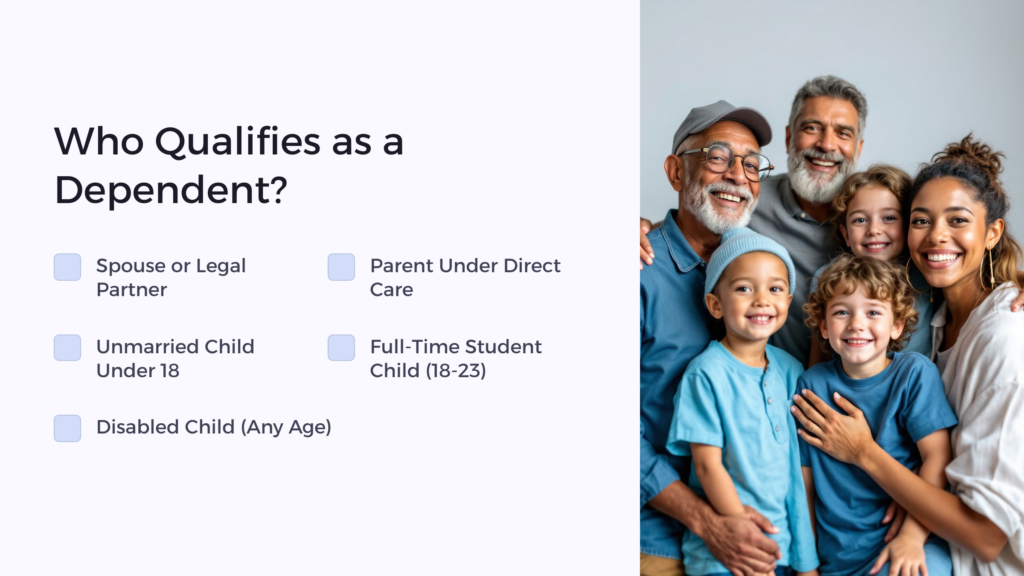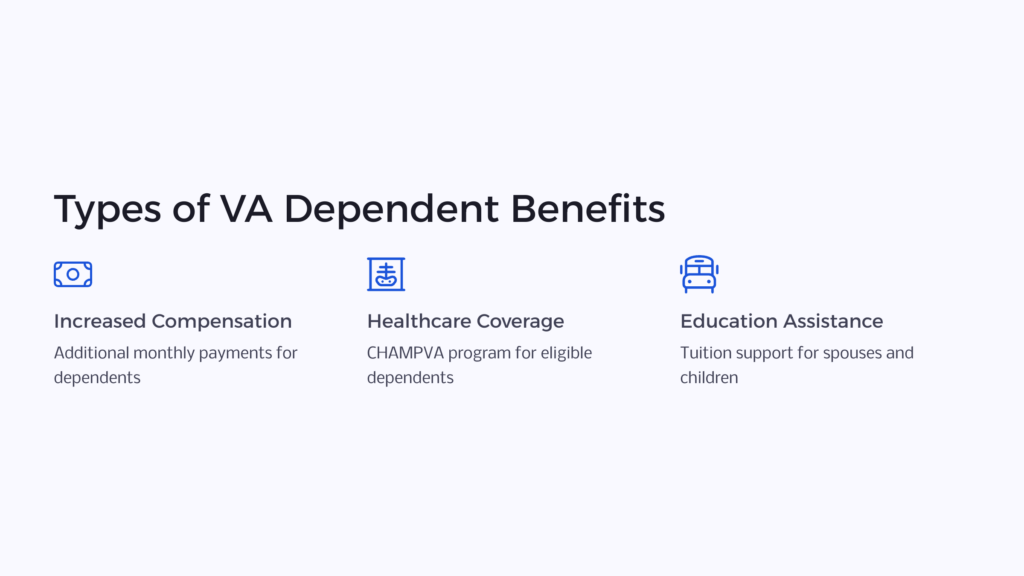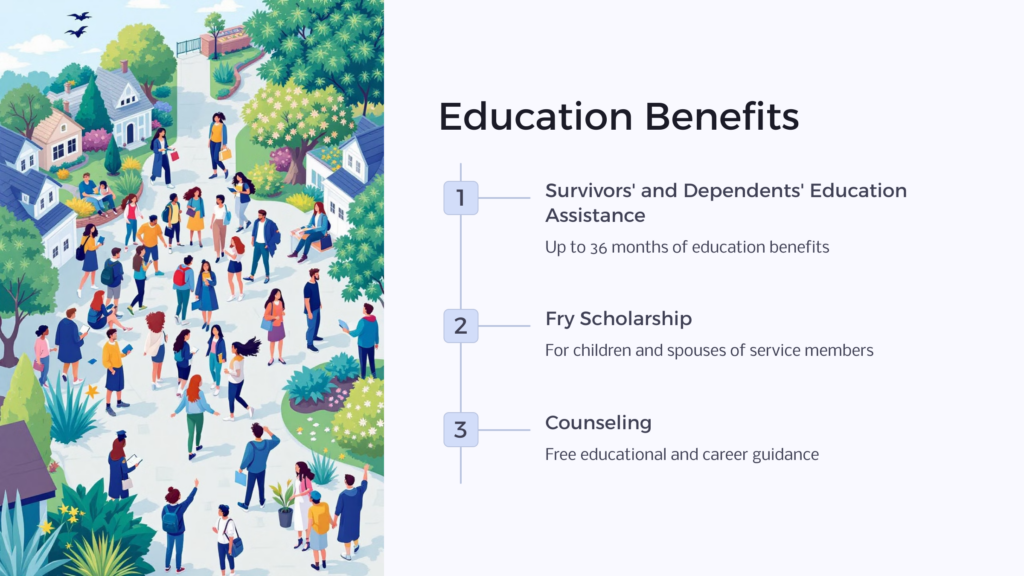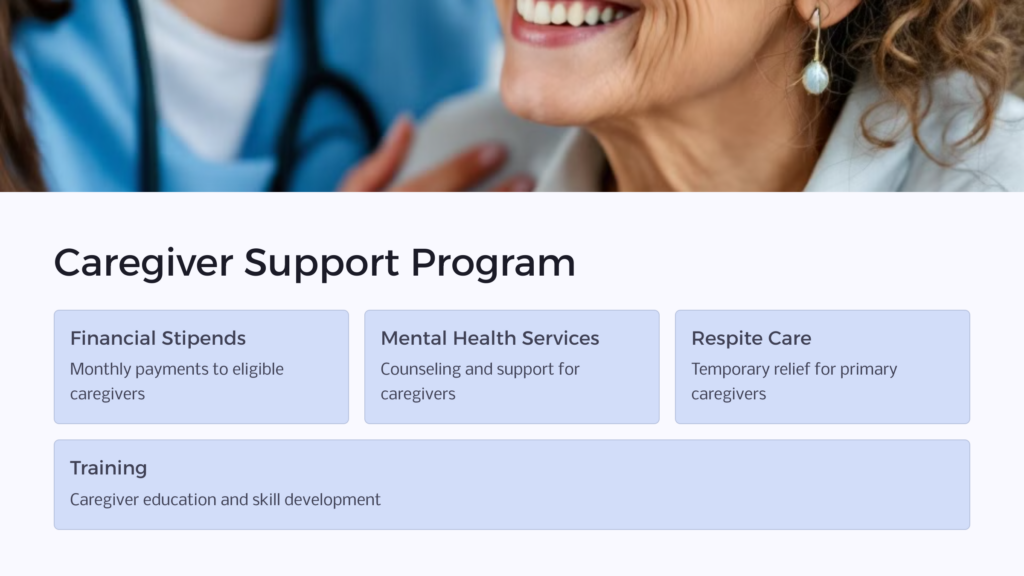Disability benefits through the U.S. Department of Veterans Affairs can be a tremendous resource for U.S. veterans who are unable to work because of a permanent service-related disability or medical condition. In addition to traditional disability benefits, the VA may also provide additional benefits to those classified as dependents. This additional compensation can provide extra peace of mind for any service member of the U.S. armed forces when it comes to taking care of the financial needs associated with caring for dependent family members.

Who Does VA Consider a Dependent?
- Spouse or legal partner
- Parent under direct care below a certain income level
- Unmarried child under 18 years old
- Unmarried child between 18 and 23 years old who is a full-time student
- Unmarried child of any age who became disabled before turning 18
If you are a U.S. veteran either currently receiving or in the process of applying for VA disability compensation, you may also be eligible for additional disability benefits for your dependents. For this to be the case, you must be eligible for VA disability benefits, with a combined disability rating of at least 30%. If both of these are true, by adding a dependent to your claim, you may be eligible for a higher monthly compensation amount.
If you haven’t yet filed your VA disability claim, you can choose to file a claim for additional compensation for dependents of your choice. You can file both documents at the same time. If you receive at least a 30% disability rating, the VA will automatically consider your request for additional compensation as it reviews your initial claim.
If you’ve already filed your claim but would like to request additional compensation for dependents, you can still file a separate claim. You can do this even if you didn’t apply for dependent benefits when you submitted your original claim – for example, if you’ve gotten married, had a biological child, or adopted a child. If you’re already receiving benefits and have added a dependent to your household, you also can file a new claim to apply for additional benefits based on your changed family circumstances.
Please note that if you need any help filing your claim, you have a couple of different options. You can work with a Veterans Service Officer or you can seek the counsel of a qualified VA disability attorney. Both can help you determine the best path forward for your claim and can offer valuable insight into the process, along with your chances of having your claim approved.
Who Does VA Consider a Dependent?
The VA recognizes several different categories of individuals as possible dependents, as outlined below. In general terms, for the VA’s purposes, a dependent is defined as a family member who is reliant on the disabled veteran financially and meets other eligibility criteria.
Spouse or Legal Partner
Some disabled veterans may receive additional disability compensation to account for the financial care of a dependent spouse. Please note that the VA does recognize same-sex marriage and will also honor common law marriages when it comes to defining a military spouse or legal partner as a dependent. To add a spouse to your disability claim, you will need to submit a VA Form 21-686c, Declaration of Status of Dependents. The same is true for adding any dependent children.
Parent in Direct Care Under a Certain Income Level
If you are the primary caregiver for a parent whose combination of net worth and income falls below a certain threshold, you may be eligible for additional veterans disability benefits to help cover the cost of your parent’s care. To request this type of compensation, you’ll need to submit a Statement of Dependency of Parent(s) (VA Form 21P-509) by mail.
Unmarried Child Under 18 Years Old
The VA recognizes that dependent children may include biological children, adopted children or step-children, as long as they meet the additional criteria. The VA also recognizes that full-time care of a child often requires substantial financial obligation. For full-time care of a child who is under age 18, you may be able to qualify for additional disability compensation to help cover those costs. You’ll need to submit a VA Form 21-686c, Declaration of Status of Dependents, in order to add dependent children to your VA disability claim.
Unmarried Child Between 18 and 23 Years Old Who is Full-Time Student
If you’d like to apply for additional compensation for a child between 18 and 23 who is enrolled as a full-time student, you’ll also need to submit a Request for Approval of School Attendance (VA Form 21-674). The VA recognizes that while these dependents are engaged in full-time study, they may need additional financial support as your dependent.
Unmarried Child of Any Age Who Became Disabled Before Turning 18
Please note that if you’re filing a claim for benefits related to an unmarried child who became disabled before age 18, you’ll also need to provide all appropriate medical evidence and documentation to support this claim. The VA recognizes that a disabled dependent may be unable to financially support himself, so the additional monthly compensation can be put toward those costs.
In some cases, when adding dependents to your claim, you also may be eligible for VA disability back pay. This means the VA may compensate you back to the date of your marriage for a spousal dependent and back to the date of the birth or adoption of a child for a child dependent, but only if you file for additional disability benefits within one year. After the one-year mark, the VA may choose not to pay you any retroactive benefits.
What Types of VA Dependent Benefits Are Available?
 A wide variety of benefits is available to dependents of U.S. veterans who qualify for VA disability benefits. These include health care and education funding, along with support for helping take care of the disabled veteran.
A wide variety of benefits is available to dependents of U.S. veterans who qualify for VA disability benefits. These include health care and education funding, along with support for helping take care of the disabled veteran.

The VA will simply increase the amount of your VA disability compensation if you have a rating of at least 30%. This additional income can go a long way toward helping cover routine, day-to-day expenses associated with being financially responsible for one or more dependents. This increase remains in effect for the duration of the disabled veteran’s life, and in the case of a deceased veteran, any dependents may be eligible on their own for Dependency Indemnity Compensation through the VA.
When it comes to medical care, the VA offers the Civilian Health and Medical Program of the Department of Veterans Affairs program, which provides health care coverage for the dependents, including both spouses and children, of most veterans who are rated at 100% disabled. The CHAMPVA program typically covers most medical services, along with supplies that are deemed medically and/or psychologically necessary. In many cases, this also includes access to prescription drug benefits.
Dependent children are eligible for this coverage until they turn 18, or until they turn 23 if they are enrolled as a student – as long as they are unmarried. For step-children, there is the added stipulation that the child must live in the home with the eligible veteran in order to be eligible. Spouses are eligible for CHAMPVA veterans benefits as long as they remain married to the disabled veteran.

Through the Survivors’ and Dependents’ Education Assistance Program or the Marine Gunnery Sergeant John David Fry Scholarship, dependents of disabled veterans can access the VA education benefits and financial aid they need to pursue their higher education. The VA offers the Survivors’ & Dependents Educational Assistance program, which provides for up to 36 months of higher education benefit for dependents of disabled veterans with a 100% disability rating. This level of disability rating translates to the expectation that the veteran’s condition is permanent and not expected to improve.
In most cases, these educational benefit programs apply toward tuition at traditional colleges and universities, community colleges, trade schools, GED training, distance learning, correspondence courses, apprenticeships, and on-the-job training. These funds even apply to testing costs associated with licenses or certifications necessary to keep a job or to advance within a career.
Spouses have 10 years from the time the veteran is approved for federal VA disability benefits to take advantage of their tuition assistance, while dependent children can use these benefits when they are between the ages of 18 and 26. Family members who meet eligibility requirements for this benefit also can receive educational counseling at no cost, which often can help individuals determine the best educational path forward for their future success.

If you have dependents who are helping provide day-to-day care for you as a disabled veteran, they may be eligible for veterans benefits through the Program of Comprehensive Assistance for Family Caregivers. With this program, the VA offers services that include financial stipends, mental health services and counseling, health insurance, respite care, and caregiver training, which can help reduce the burden of stress on your loved ones who are acting as caregivers. The program is designed to provide support for eligible dependent caregivers of U.S. veterans who have a serious medical condition either caused or exacerbated by their time of military service on or after Sept. 11.
And for survivors of disabled military veterans who pass away from an active duty service connected disability or medical condition, there is the chance that they are eligible for Dependency and Indemnity Compensation, which can help make sure survivors receive any retroactive pay the veteran would have received if alive, up to the date of the veteran’s death. Spouses are typically eligible for these VA survivor benefits as long as they were married to the disabled veteran for at least one year immediately prior to the disabled veteran’s death. Surviving spouses may be eligible for additional DIC benefits if any of the following are true:
- Prior to death, the veteran was rated at a 100% disability level and received benefits accordingly for at least eight years.
- A surviving spouse has eligible dependent children under age 18
- A surviving spouse is housebound or requires aid and attendance benefits
VA Dependent Benefits
If you are a disabled U.S. veteran who either already receives VA disability compensation or is in the process of applying for VA disability benefits, it’s important to understand that the scope of VA benefits isn’t limited to simply yourself. There are several programs and levels of compensation for which your dependents may also be eligible, including valuable health care coverage and education assistance.
Consider the options we’ve presented here and discuss them with your VSO or qualified VA disability attorney. You may decide that it makes sense to try to qualify for additional VA disability compensation or other benefits that improve the quality of life for your dependents as you ease their financial burden.
 Benefits.com Advisors
Benefits.com Advisors
With expertise spanning local, state, and federal benefit programs, our team is dedicated to guiding individuals towards the perfect program tailored to their unique circumstances.
Rise to the top with Peak Benefits!
Join our Peak Benefits Newsletter for the latest news, resources, and offers on all things government benefits.


















